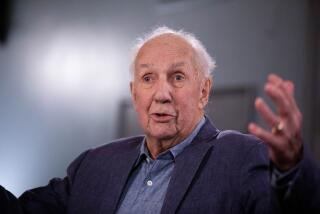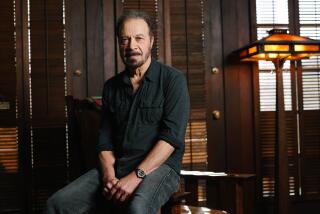Appreciation: Mike Nichols’ theater legacy: Laughter and tears with equal genius

Whenever Mike Nichols worked in the theater, it was inevitably an event, the focal point of the season — the show you simply had to get tickets to or be left in the conversational cold.
When he directed “Waiting for Godot” with Steve Martin and Robin Williams at Lincoln Center’s relatively small Mitzi E. Newhouse Theater in 1988, Broadway was suddenly in eclipse. When he directed “The Seagull” in Central Park with Meryl Streep, Philip Seymour Hoffman and Natalie Portman in 2001, theatergoers were camped outside the Public Theater hoping to score a seat for the next night’s show.
I knew I arrived as a critic when my request to the publicist at the Public Theater for a ticket to this most coveted Chekhov event since Stanislavsky’s productions at the Moscow Art Theatre was answered with a pair of house seats. I seem to recall dancing past the line of sleeping bags outside the Public as I wended my way home from the Village Voice, where I worked at the time, grateful that I wouldn’t have to stay up all night to see the following evening’s show.
A legendary movie director, Nichols, who died Wednesday at 83, had as much clout as anyone working in the last few decades on Broadway — and if you don’t believe me, you can inventory his seven Tony Awards for directing.
As a director, he was unusually diverse in his choice of material. Talent is what drew him, and he had a capacious sensibility — for comedy, drama, solo work and musicals. As a part of a legendary comedy duo with Elaine May, he had tremendous instinct not only for what was funny but what could grab an audience, surprise them, wake their minds, move them to indignation or, better yet, tears.
He was in a sense a master of crowd control, but a benign master with an ethical core who never lost sight of the value of entertainment.
It made perfect sense that the man who was one of the original producers of the musical “Annie” was also the Broadway director of “Hurlyburly,” David Rabe’s cocaine-strewn drama about Hollywood hedonists. Or that after hitting box office gold with the musical spoof “Spamalot,” he switched gears and concentrated on dramas by Clifford Odets, Arthur Miller and Harold Pinter, each as stylistically different from one another as from “Spamalot.”
How good was Nichols? So good that the very best actors, shooting stars and established veterans wanted to work with him again and again.
In his unsparingly candid diaries, Richard Burton observes, “The last man to give me direction which I found interesting and followable and sometimes enthrallingly brilliant was Mike Nichols and that was in the comedy sequences in [the film version of ‘Who’s Afraid of Virginia] Woolf?’ ” High praise from a man who a few sentences later takes down Marty Ritt, Joseph L. Mankiewicz and “Babblin’” Tony Richardson in a spray of sniper fire.
Nichols’ direction of the television adaptation of Tony Kushner’s “Angels in America” for HBO clarified for me the nature of his genius. In an epic play bursting with political ideas and historical material, Nichols, through the intimacy of his camera work and the resourcefulness of his actors, never let us lose sight of the interior life of the characters whose world has been turned upside down by the AIDS crisis. The textured handling of these private stories made Kushner’s fiercely public-minded play that much more urgent — and timeless.
But the memory that I will treasure most from Nichols’ career, notwithstanding a few immortal scenes from “The Graduate,” is the confrontation at the motel between Hoffman’s Willy Loman and Andrew Garfield’s Biff in the Tony-winning 2012 revival of “Death of a Salesman.” The emotional intensity of this reckoning between a guilty, ill-equipped father and a shattered worshipful son was — and I’m not using the word figuratively here — overwhelming.
Although I have lectured on the subject of catharsis, I don’t believe I have ever until that moment at the Ethel Barrymore Theatre at the age of 46 experienced its full power. For that I am eternally grateful to Nichols — showman extraordinaire, who knew that the source of the most unforgettable entertainment was deep feeling, larger concern and unexpected empathy.
Life taught this refugee from Hitler’s Europe early on that the line between comedy and tragedy was arbitrary, and he reiterated the lesson to memorable effect throughout his glorious career.
Twitter: @CharlesMcNulty
More to Read
The biggest entertainment stories
Get our big stories about Hollywood, film, television, music, arts, culture and more right in your inbox as soon as they publish.
You may occasionally receive promotional content from the Los Angeles Times.







